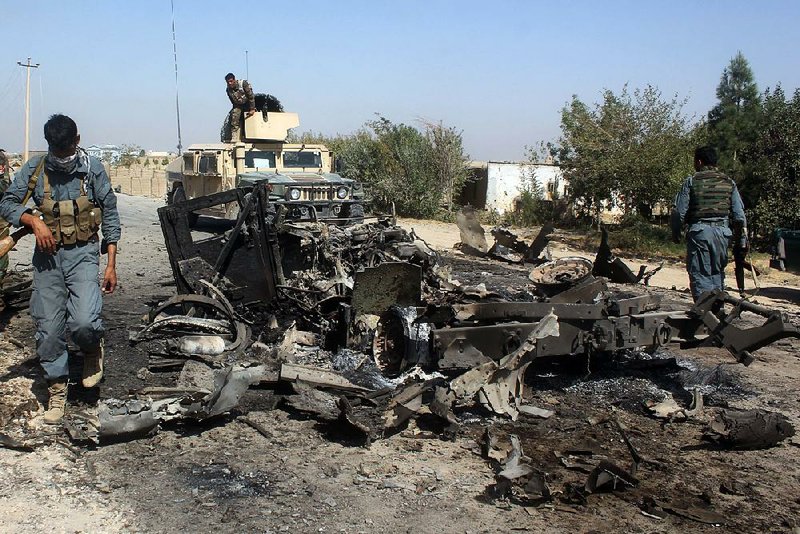KABUL, Afghanistan -- Afghan forces were going door to door in Kunduz on Friday searching for Taliban fighters who had overtaken the northern city earlier in the week until a U.S.-backed government counterattack flushed out most of the militants.
Residents reached by phone said the city's streets were largely empty and that many people remained in their homes. Some Taliban militants were holed up in residential and multistory buildings from which they launched sporadic attacks.
The Afghan flag flew from the main traffic circle in the provincial capital of 300,000 people, but residents said they heard occasional gunfire coming from the direction of the governor's office and police headquarters.
"The main roads of the city are still divided" between government- and Taliban-controlled areas, said Abdul Wadood Peyman, a member of parliament from Kunduz.
Thousands of Afghan soldiers, supported by U.S. military advisers, surged into Kunduz early Thursday and pushed back Taliban fighters who had taken over the city three days earlier. It was the first time the insurgent group had captured a major city since the 2001 U.S.-led invasion drove them from power, and one of the most significant military operations by a U.S. force that has been scaled down substantially since December.
Coalition officials said Friday that U.S. special forces troops traded fire with insurgents in Kunduz, one of the first times this year that U.S. service members have been involved in direct ground combat in Afghanistan. The clash occurred Thursday in response to "an insurgent threat," and the U.S. forces acted "in self-defense," said coalition spokesman Col. Brian Tribus. No U.S. service members were injured, he said. A total of 9,800 U.S. troops remain in Afghanistan as part of a NATO training and advisory group that is not supposed to involve combat, although officials said the troops are authorized to protect themselves when necessary.
The Taliban's new leader, Mullah Akhtar Mansoor, who assumed control of the organization two months ago, on Friday called the capture of Kunduz "a symbolic victory" that was "celebrated by the ordinary people of the city."
"We are hoping to hit this government harder every time and win back our land from these tyrants," he said.
The Afghan Ministry of Public Health has recorded at least 466 injuries and 60 deaths in Kunduz, the vast majority of which were civilians. More than 6,000 people have fled the fighting, according to the United Nations, while those left behind in the country's fifth-largest city face severe shortages of basic goods and skyrocketing prices of staples such as bread.
Representatives of local and international aid agencies said they had been targeted by Taliban militants, who looted their facilities and attacked staff members.
Officials, residents and aid workers reported growing shortages of food and medicines. Water and electricity were cut off, and most businesses shuttered.
"We urgently need medical supplies because the battle is still going on and so we expect more casualties," said Saad Mukhar, head of the city's public health department, adding that supplies sent from Kabul were being held up on the way.
Among the agencies hit hardest was the Kabul-based Women for Afghan Women, which said all of its facilities in Kunduz were raided by suspected Taliban fighters. Najia Nasim, the group's country director, said the agency was "trying desperately" to get the organization's more than 60 workers and their families out of the city.
As an organization that operates several safe houses for women, Nasim said her staff members knew they would be among the first targeted by the Taliban, who had largely banned education and employment for women in the six years they ruled Afghanistan until 2001.
"Some of our staff have fled to Takhar province [to the east] or Kabul, but others are stuck in the fighting," Nasim said. "What's most worrying for us though, are the people we can't reach due to lack of electricity."
Nasim said her colleagues who could escape left everything behind, and their empty houses have been ransacked or are serving as hideouts for Taliban fighters.
Although the Taliban tried to exude a more youthful, tolerant face -- posing for selfies with residents and publicly promising that no harm would come to residents -- unconfirmed reports from the city suggested more violent behavior. Peyman, the lawmaker, said government workers were targeted and "killed in plain sight, in front of their families and neighbors."
In a phone interview, Peyman fell silent as he described "abuse against women," including rape, that he said was committed by Taliban fighters.
Information for this article was contributed by Ali M. Latifi, Shashank Bengali and W.J. Hennigan of the Los Angeles Times and by Mirwais Khan, Lynne O'Donnell, Amir Shah and Humayoon Babur of The Associated Press.
A Section on 10/03/2015
